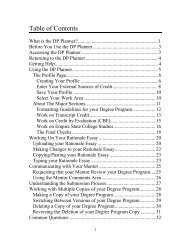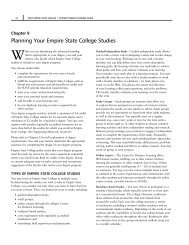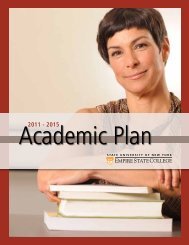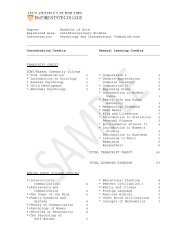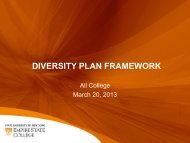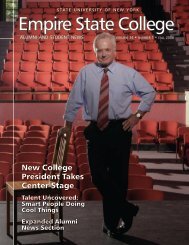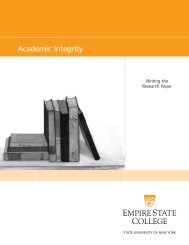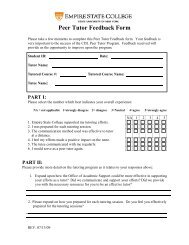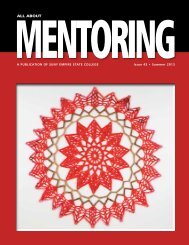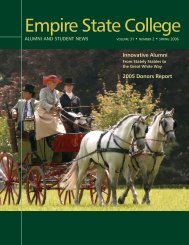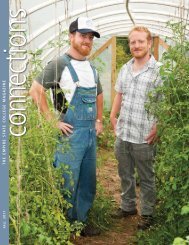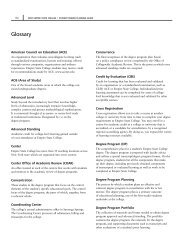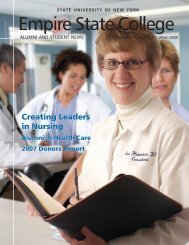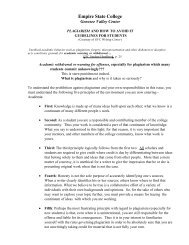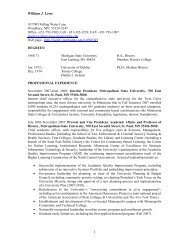All About Mentoring Spring 2011 - SUNY Empire State College
All About Mentoring Spring 2011 - SUNY Empire State College
All About Mentoring Spring 2011 - SUNY Empire State College
You also want an ePaper? Increase the reach of your titles
YUMPU automatically turns print PDFs into web optimized ePapers that Google loves.
50<br />
Homecoming; in class we watch the film<br />
version of the Faulkner short story “Two<br />
Brothers,” that chronicles how a young boy<br />
reacts to his brother’s enlistment during<br />
WWII. We also have students listen to<br />
popular anti-war music from the 1960s<br />
and watch “Private SNAFU” cartoons from<br />
WWII. We bring Twain’s “The War Prayer”<br />
to class, where we read it together and<br />
discuss what Twain was saying to those who<br />
support war but are not soldiers. Students<br />
are given the opportunity to write a true or<br />
fictionalized story about a soldier coming<br />
home from war, from either a soldier’s<br />
perspective, or that of someone who has<br />
been on the homefront.<br />
Lisa, a student with no military experience,<br />
wrote about witnessing a soldier’s young<br />
family waiting on the tarmac at an airport<br />
as his flag-draped coffin was carried off a<br />
plane. As the family walked back through<br />
the waiting area, people in the airport<br />
became silent; some saluted and others<br />
bowed their heads. She told the class it was<br />
at that moment the war became real to her.<br />
Our veteran students usually choose to write<br />
about their own experience. Dick, who had<br />
been a helicopter pilot in Vietnam, wrote<br />
about how difficult re-entry was:<br />
When our tour of duty in Vietnam was<br />
down to the last 30 days we became<br />
so-called short timers. We would joke<br />
with each other about our return to the<br />
world. We reminded ourselves not to<br />
use profanity when asking our mothersin-law<br />
to pass the salt. We boasted that<br />
the first thing we would do at home<br />
was to make love with our wives; the<br />
second would be to put down our<br />
luggage. We promised to never come<br />
back to Vietnam … . It immediately<br />
became apparent to me that they [my<br />
family] had gone crazy while I was<br />
away. I knew they loved me and meant<br />
well, but their words and actions were<br />
confusing. I had no idea of what it<br />
was they expected of me or what their<br />
conversations were about. My son<br />
screeched and cried all the while. My<br />
mother asked me silly questions. My<br />
wife, now a most serious young mother,<br />
acted nothing like the young bride I had<br />
left to go to war. I felt quite ready to<br />
get on the next plane to Saigon.<br />
A student who had been deployed twice<br />
and expected to be deployed again wrote<br />
about using alcohol to cope with feelings<br />
of guilt and anxiety. He described plunging<br />
back into his old life, only to find himself<br />
incapacitated with nightmares and panic<br />
attacks. He ended his essay by writing: “ …<br />
when you go to war you will always carry<br />
that war with you. And once you become a<br />
soldier you will always remain one.”<br />
Module Five is Coping. We begin by<br />
discussing Pennebaker’s healing and writing<br />
research and DeSalvo’s five qualities of<br />
a healing narrative. We talk about war<br />
and trauma, and present this work as a<br />
writing tool students can employ at any<br />
time to enable their own healing from<br />
trauma. We have students read George<br />
Saunders’ humorous essay, “Heavy<br />
Artillery,” and discuss the role of humor<br />
in coping. For their writing assignment,<br />
students interview someone who has been<br />
significantly influenced by war in order to<br />
learn about the circumstances of the war<br />
experience, how he/she has coped, and how<br />
the experience changed the person. This<br />
turned out to be one of our most powerful<br />
assignments. Students choose a wide variety<br />
of people to interview, but often select<br />
relatives who they had previously never<br />
talked to about their war experiences.<br />
One student interviewed his grandmother<br />
about how she coped during WWII. He<br />
learned how memories of war, even for<br />
those on the homefront, last a lifetime. Also,<br />
he discovered the contrast between civilian<br />
involvement in the war effort then and now.<br />
Some students interviewed the spouses of<br />
deployed soldiers, and others interviewed<br />
people in the military who have been<br />
deployed about coping both in combat and<br />
with reintegration. Dick decided to interview<br />
his wife, who was 19 and pregnant when<br />
he left for Vietnam; they had never talked<br />
about what it had been like for her while he<br />
was at war and when he returned.<br />
She said she was angry at the Army<br />
for turning our family upside down<br />
and even angrier with the anti-war<br />
demonstrators who used such terms as<br />
‘baby killers’ to describe soldiers … .<br />
According to her, I returned from<br />
Vietnam an angry, impatient man who<br />
had no time for either her or our son.<br />
She said I acted as if I could not wait to<br />
get back to the company of my buddies<br />
in the Army … . When asked if feelings<br />
leftover from her wartime experience<br />
influenced her views of current issues,<br />
she responded saying that she was<br />
disheartened by our country unfairly<br />
asking so much of today’s military<br />
families. She went on to say our<br />
nation’s unwillingness to share the<br />
burden of our military families seems<br />
evidence that the country has lost its<br />
moral compass.<br />
One particularly powerful documentary we<br />
watch together during this module is Muse<br />
of Fire. This film, featuring soldiers and<br />
family members reading their writing, serves<br />
as a model for our students and emphasizes<br />
the healing benefits of telling our stories.<br />
The final module is Reintegration. Students<br />
read a series of stories and articles about<br />
the challenges of soldiers reintegrating into<br />
society after having been at war. In class,<br />
we watch a YouTube talk by psychotherapist<br />
Ed Tick who points out that many<br />
indigenous societies have rituals and<br />
ceremonies that allow returning warriors<br />
to tell their stories and help them become<br />
part of society again. Our American society<br />
provides no easy way for soldiers to pick up<br />
their civilian lives again.<br />
One of the assigned readings is “Betrayal<br />
in the Field” by Helen Benedict that<br />
chronicles the difficulties women soldiers<br />
endure beyond the trauma of war: many are<br />
sexually harassed and even raped by their<br />
fellow soldiers. When they return home<br />
they find little or no help coming to terms<br />
with this devastating trauma. This was<br />
particularly eye-opening to our students,<br />
including our male veterans.<br />
Have we accomplished what we set out<br />
to do when we created War Stories We<br />
know some things for sure. War Stories<br />
created a communal academic environment<br />
where people deeply affected by war<br />
could write the truth, as they know it,<br />
about life-defining experiences they have<br />
participated in or witnessed – with support<br />
and without judgment. War Stories gave<br />
people permission to write, to process their<br />
experience, to gain clarity and perspective –<br />
to take action, rather than to feel helpless<br />
in the face of traumatic events. The Gulf<br />
suny empire state college • all about mentoring • issue 39 • spring <strong>2011</strong>



